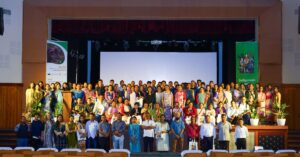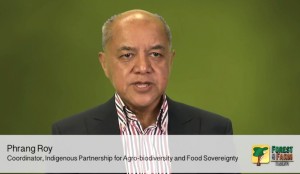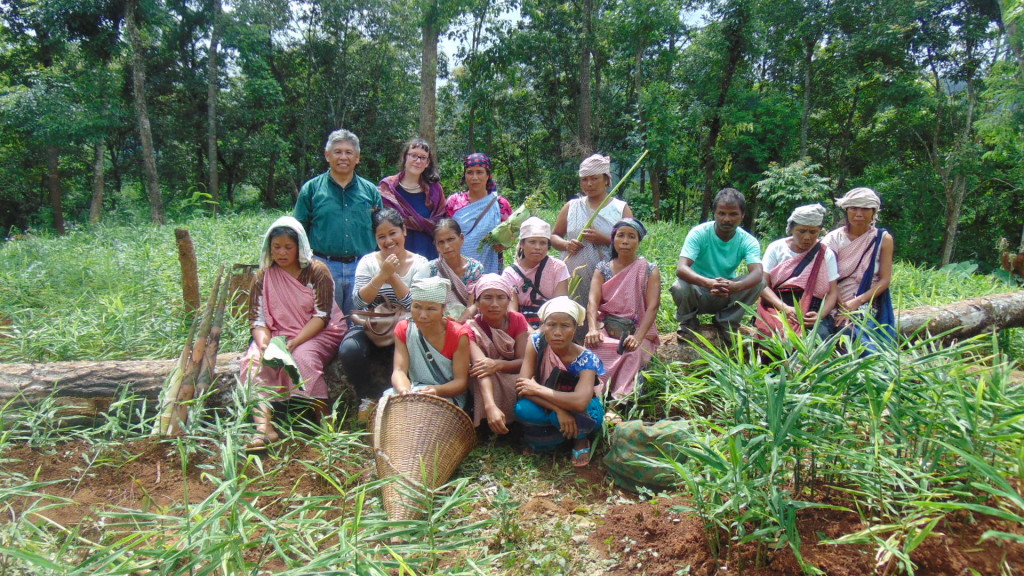
Photo: NESFAS/Janak Preet Singh
On the 24th of August, as part of his tour to various villages in Meghalaya, visiting Agroecologist, Dr Francisco J Rosado May made a trip to the shifting cultivation field of Custodian Farmer Kong Radian Syiem at the village of Khweng, Ri Bhoi District. There was shown the different types of crops that are planted by her. Later Dr Francisco was heard saying that he was very impressed with the diversity of plants he saw there and that he could relate the farming practice he saw at Kong Rediyan’sjhum field to the practices in Mexico where he comes from. Holding a degree on Agronomy, Dr Francisco was able to draw quick conclusions on the trouble spots that he saw and also suggest solutions to solve the problems.
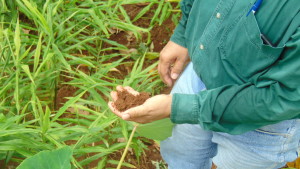
Photo: NESFAS/ Janak Preet Singh
For example, he pointed out that the beds in the shifting cultivation field there were vertically laid such that they were sloping down the hill. He told the farmers present that it would be better if the beds were put horizontally across the field so as to fascilitate the retention of the top soil, which would otherwise drain away at the time of heavy rainfall. Looking at the quality of the soil, he commented that the soil looked very nutrient rich, especially nitrogen which he said was due to nitrogen fixing plants like beans, etc.
After observing and comparing the several paddy fields he visited, he highlighted that some of the crops were looking yellowish indicating that they were unhealthy as compared to the greener looking ones. The solution – following this paddy season the farmers should consider planting nitrogen fixing plants for a healthier soil in the next season.
Thanking the community for their hospitality and their openness in sharing their knowledge with him he urged them to preserve their knowledge and make sure they teach their children about it.
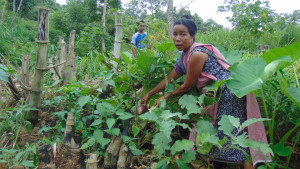
Photo: NESFAS/ Janak Preet Singh
Kong Redian in response shared her story of how her parents taught her how to farm from a very young age and that she has been since carrying out the same agricultural practices that she learnt as a child and that she intends to carry on the same way. Citing an example of what her parents taught her, she spoke about how plants like pumpkin and cucumber should always be planted at a distance from each other to prevent the creepers from covering all the other plants.
She also pointed out that one will never come across any large scale production of any particular crop in Khweng because the farmers there do not wish to follow the system of mono-cropping because it disturbs the whole production system and most importantly their land/soil due to the requirement of usage of pesticides in large volumes. She cited the example of the neighboring villages which have poor soil which is a resultant of chemical agriculture.
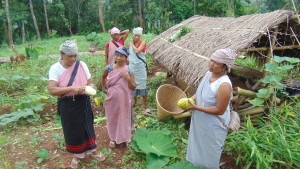 Dr Francisco also drew attention to the fact that the women farmers in Khweng village are beautiful and that none of them have grey hair (generating peals of laughter from the women), which indicates that all of them consume good, healthy and clean food. He drew parallels saying that the women reminded him of his grandmother who was a farmer too and had no grey hair because she grew and ate healthy food.
Dr Francisco also drew attention to the fact that the women farmers in Khweng village are beautiful and that none of them have grey hair (generating peals of laughter from the women), which indicates that all of them consume good, healthy and clean food. He drew parallels saying that the women reminded him of his grandmother who was a farmer too and had no grey hair because she grew and ate healthy food.
Reported by Janak Preet Singh


